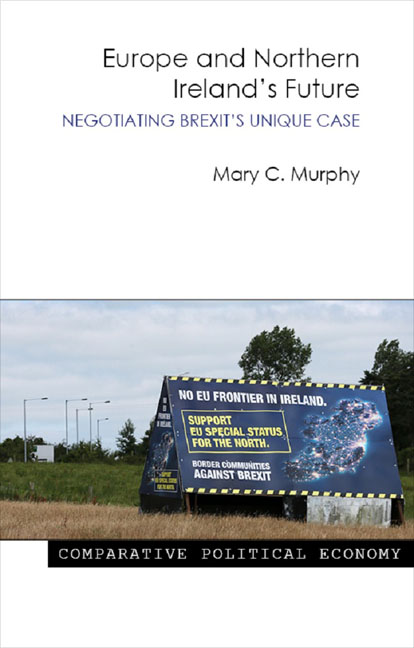Book contents
- Frontmatter
- Dedication
- Contents
- Acknowledgements
- Foreword
- Abbreviations
- 1 The political economy of a pressured relationship
- 2 The politicization of Brexit in Northern Ireland
- 3 When introverted politics and political economy collide
- 4 Who speaks for Northern Ireland?
- 5 Europe and Northern Ireland’s future
- References
- Index
4 - Who speaks for Northern Ireland?
Published online by Cambridge University Press: 16 August 2023
- Frontmatter
- Dedication
- Contents
- Acknowledgements
- Foreword
- Abbreviations
- 1 The political economy of a pressured relationship
- 2 The politicization of Brexit in Northern Ireland
- 3 When introverted politics and political economy collide
- 4 Who speaks for Northern Ireland?
- 5 Europe and Northern Ireland’s future
- References
- Index
Summary
The EU referendum result was met with widespread shock and surprise. The narrow win for Leave was largely unexpected. The following day the Belfast Telegraph (25 June 2016) front page declared “A step into the unknown”. The value of sterling had plummeted in response to the vote and the UK Prime Minister David Cameron had resigned. In Northern Ireland, the immediate response from unionism and nationalism exposed a clear difference between the two communities. DUP First Minister Arlene Foster declared: “I think this is a good result for the United Kingdom. Our nation state has made a clear definition as to where they want to go forward.” Deputy First Minister, Sinn Féin’s Martin McGuinness, reacted very differently and viewed the result as justification for pushing a different future for Northern Ireland: “I think there is a democratic imperative for a border poll”. The strong vote in favour of Remain in Scotland was interpreted by First Minister Nicola Sturgeon as: “a sign of divergence between Scotland and large parts of the rest of the UK in how we see our place in the world”. For its part, the Irish government was dismayed by the result and the then Taoiseach Enda Kenny moved to immediately recall the Irish parliament. In a joint statement by EU leaders and the Netherlands presidency of the EU, the three presidents and prime minister expressed regret at the decision but were clear in their commitment to the future of the European project. They voiced a desire to see the UK move swiftly to give effect to the referendum result. A combination of regret and resilience also featured in the responses of German Chancellor Angela Merkel and her French counterpart, François Hollande, to the vote.
The referendum result meant that the UK was now facing a period of political and economic turmoil and possibly sustained instability. The mammoth and unprecedented task of steering the UK out of the EU was to be led by the new Prime Minister Theresa May, who was installed in July 2016.
- Type
- Chapter
- Information
- Europe and Northern Ireland's FutureNegotiating Brexit's Unique Case, pp. 97 - 122Publisher: Agenda PublishingPrint publication year: 2018

